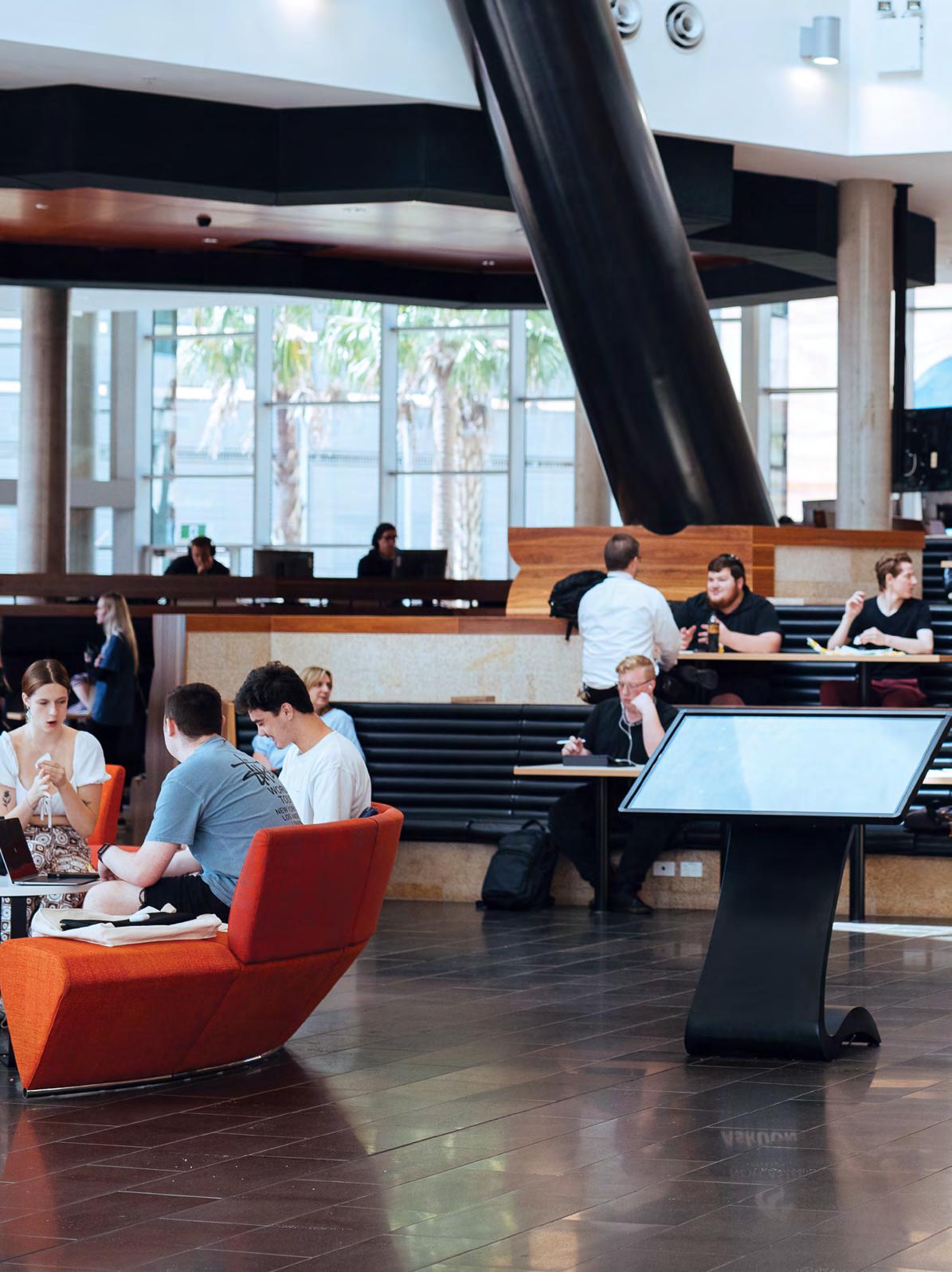




We are delighted that you are interested in studying with us at the University of Newcastle, Australia. As a University ranked amongst the top 175 Universities in the world1, it is our mission to provide a world class education to our students.
With almost 37,000 students from more than 100 countries, our campuses in Newcastle, the Central Coast, Sydney and Singapore reflect the cultural diversity of our students. Every one of our international students brings diversity and new perspectives to our University.
It is our priority to support students from all backgrounds and our University is a place where you can succeed, feel welcome and enjoy an incredible student experience.
Students at our University are taught by some of the best teachers and researchers in the world who have real-world experience. Our teachers work collaboratively with industry and our community, and we have embedded practical learning experiences into all of our study programs. This connects our students with industry and offers real-world learning opportunities – giving you a competitive advantage for employment after you graduate.
Our University is committed to solving real-world problems locally and globally. We have a proud history of achievement that has led to strong outcomes in international university rankings.
We show leadership on important social issues and our students have told us that they value the importance we place on creating a better future. We are ranked Top 30 in the world for Impact2, recognising that a sustainable future can only be realised with shared vision, strong partnerships, and cooperation.
We recognise our role in addressing climate change and we take our responsibility seriously. To support this, we
are investing in research into next-generation energy and resources. We are also taking steps to minimise our own impact on the planet. Our campuses are powered with 100 per cent renewable electricity and we are on track to achieving our goal of being carbon neutral by 2025.
We also welcome you to Newcastle – a vibrant, creative city with a friendly, welcoming community. In partnership with the City of Newcastle, the University of Newcastle has launched an International Student Ambassador initiative to welcome and orientate international students and their families to life in Newcastle. Together we aim to cultivate a culture of belonging for all international students living and studying in Newcastle. The University of Newcastle established the College of International Education to provide international students like you with a pathway to join our University. Through the College, we have created an environment of support where you can grow and will be prepared to succeed with your studies. If you are looking for a University where you can make a difference and be inspired by leading educators who are working to create a better future, there is a place for you at the University of Newcastle.
Professor Alex Zelinsky AO Vice-Chancellor and President


Thank you for your interest in the University of Newcastle College of International Education.
Newcastle is one of Australia’s most under-rated cities yet it offers students one of the best study experiences in the world. As the seventh largest city in Australia, you can expect to find everything that a big city offers but with a more relaxed vibe. It is an affordable, clean, safe and vibrant city to study, live and work. It is also a city in the middle of an exciting urban renewal, with billions of dollars of investment behind a construction boom that is changing the city’s skyline.
This is your first step towards your undergraduate or postgraduate study at the University of Newcastle – now ranked in 175 in the world1.
We know that moving to a new city can be exciting but challenging. Our dedicated and friendly Student Experience team are here to ensure you are supported throughout
your time at the College. They can assist you with program advice, information about campus events, accommodation options, and transitioning to the University.
Our team of experienced teaching staff are looking forward to meeting you, and giving you the confidence and knowledge you need for University studies. Beyond academic excellence, our college community fosters a vibrant and welcoming atmosphere. Engaging in a range of extracurricular activities, cultural events, and sports, you will have ample opportunities to discover your passions, develop leadership skills, and create memories that will last a lifetime.
On behalf of all our staff at the University of Newcastle College of International Education, I extend a personal welcome to you. The College is a wonderful place to study and I am confident that you will enjoy your time here with us.
Jonathan Hunter College Director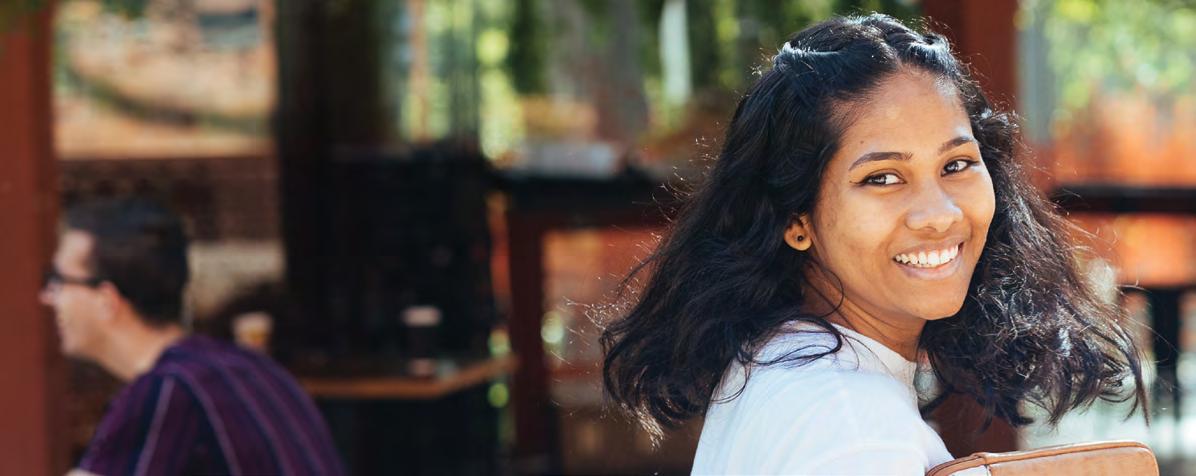
Choosing to study at the University of Newcastle can give you a competitive advantage for your future career. Here are some of the top reasons to study with us.
1 Study at a top 175 university in the world1
You will have access to world-class programs, inspiring and collaborative learning environments, and opportunities to put theory into practice with real-world experiences.
Learn from our passionate and talented teaching staff who have strong industry connections and experience.
All degrees have an embedded Work-Integrated Learning component. We offer the chance to tap into the University's industry connections for practical work experience, greater connection with local, regional and national industry partners, and the opportunity to grow your professional network, unlocking opportunity for professional growth and development.
The Australian Government allows students who meet the study and skills criteria to stay temporarily in Australia after they complete their studies to gain valuable work experience in Australia. To promote in-demand industries and living and working in regional areas, students who choose to study with us may be eligible to stay up to 6 years depending on the chosen degree, level of Australian study qualification and location2
More than 89.8% of our undergraduates and 93.3% of our postgraduates gain employment within four months of completing their studies. Our students start post-study work with higher salaries than the Australian average3
39,096 students from 98 nations including 5,242 international enrolments4
A$66,800
median starting salary for undergraduate employmentabove the national average3
A$100,000
median starting salary for postgraduate employmentabove the national average3

Newcastle and the Central Coast have the convenience and benefits of a big city, without the usual distractions from study. All campuses have dedicated study spaces to allow students to focus. Our strong industry partner connections throughout Australia provide benefits for students from all study areas.
For study and living, Newcastle and the Central Coast are more affordable than most major cities in Australia. We also run workshops and classes to help you find part-time work while you study. With a range of international scholarships, there are many affordable ways to study with us.
We have practical learning experiences in all of our study programs. This ensures you will be well prepared for work environments, and ready to take on new challenges.
Our international and domestic students love studying at our beautiful campuses. With friendly support services and staff, we help make your stay safe and secure, so you can focus on your study and gain unforgettable experiences in Australia.

Newcastle
Newcastle
Lake
Newcastle
Hunter
Central
Port

1
2 The University of Newcastle College of International Education
NUspace, Hunter St & Auckland St, Newcastle, NSW, 2300, Australia
The University of Newcastle Central Coast campuses (Ourimbah and Gosford)
Sydney campus


774,500 population**
297,901 jobs in the Hunter Region**

An economic output of A$129.541 billion per annum**
Newcastle is a vibrant coastal city with restaurants, cafes and pubs. It is the second largest city in the state of New South Wales, 2 hours north of Sydney. There are many events and things to do and you will be warmly welcomed to explore the Australian lifestyle and culture. For international students, Newcastle is:
• more affordable than other major cities
• a vibrant city
• friendly and safe
• great for work opportunities

Post study work opportunities are available in Australia after successful completion of study4
Surrounding Newcastle are regional attractions including:
• Lake Macquarie - Australia’s largest coastal saltwater lake
• Port Stephens - a collection of seaside villages with beautiful sand dunes
• Hunter Valley - stunning vineyards, valleys and gourmet eateries
• Barrington Tops – a world-heritage listed rainforest popular for bushwalking, kayaking, abseiling and mountain biking

There are many low-cost and free activities for you and your friends around the city. Here are some ideas to start with:
• Rent a bike, ride along the coast and watch for whales in winter Newcastle enjoys a vibrant live music scene
• Go hiking or spot wildlife at Blackbutt Nature Reserve or the Hunter Valley Zoo
• Grab some fresh produce or a bite to eat at Newcastle City Farmer’s Market
• Explore arts and history at Newcastle’s Museum, Art Gallery or Civic Theatre
• Be spotted for talent, singing your heart out at karaoke nights at venues across Newcastle Go for a dip at one of Newcastle’s worldfamous beaches or swimming baths
• Enjoy a boutique shopping experience on Darby Street or visit our major shopping malls
To find other activities around Newcastle, go to visitnewcastle.com.au/events
Supporting over 297,900 jobs, there are many part-time and full-time employment opportunities within Newcastle1. The major industries operating within the region include Health Care and Social Assistance, Education, Training, Retail Trade, Construction and Accommodation, Professional, Scientific and Technical Services and Food Services, to name a few.
With a growing population of more than 774,500 people, the Hunter Region supports 297,901 jobs and has an annual economic output of A$129.541 billion1

With a range of mouth-watering restaurants, bars and cafes, Newcastle has cuisines to suit all tastes. The two main destinations for food lovers are Darby Street in Cooks Hill and Beaumont Street in Hamilton. Here are some local favourites2 to try:
• Darby Street - Goldbergs, Three Monkeys or Autumn Rooms (cafés), Kai Fan Chinese Restaurant or Darby Raj (Indian) Beaumont Street - Mockingbird (café), In Forno (Italian), Kings XI (Indian), Bangkok Nights (Thai) or Eight Buns (Chinese)
• Elsewhere in Newcastle - Ginger Meg's (Asian fusion), MEET (Brazilian), Sapphire Indian, Glebe Takeaway (fish and chips) or Habesha Restaurant (Ethiopian)
• Best beach views - try cafés including Estabar, Newcastle Beach Kiosk or Merewether Surfhouse
Cooking a dish from home? There are many multicultural grocers and shops to find all your favourite ingredients. Try Young Asian Grocery, Kwon Mart, Raj Spices, House of Asia, Kairali or Bibina to name a few.
The people of Newcastle, known as Novocastrians, love a range of sports. You can get involved and: Watch the Newcastle Knights (rugby league) or the Newcastle Jets (football) at McDonald Jones Stadium
• Play cricket, tennis, netball, basketball, baseball, hockey, badminton, football/soccer and more around the city
• Swim indoors or outdoors, at swimming pools, coastal baths or patrolled beaches
Smart parking app, next-gen streetlight technology and interactive help screens.
Free high-speed public WiFi in the CBD and apps with real-time information.
Trains, trams and buses safely connect our campuses to the city and beach.
The University offers free shuttles between its Newcastle campuses, and shuttles from Newcastle Callaghan to nearby local shops.
Frequent direct flights to major Australian cities and upgrades to the international terminal due to be completed by the end of 2024. Awarded Australia's Best Major Airport in 20213
The University offers free airport transfer from both Newcastle and Sydney airports for newly arrived international students. For more information and book this service, visit: newcastle. edu.au/study/international/register-your-arrival
• Work out with student discounts at The Forum gyms based at Callaghan campus and in the city Visit Newcastle.
Darby Street, Newcastle 11 Newcastle
The University of Newcastle makes it very easy for students to adjust to university life, whether you choose to live on or off campus. We have a dedicated support team to help students adapt to a new country and studying in Australia. You will make friends quickly with many academic, social and sporting activities each week.
We know students need secure, affordable and comfortable accommodation when they are studying. Our campuses are home to around 1,800 students from across Australia and the world.
We offer a range of customised living options, from self-contained apartments, dormitory-style shared accommodation and modern apartment buildings. Our shared facilities are world class, boasting a cinema room, communal commercial kitchens, swimming pools and more.
Weekly prices range from A$183 (non-catered) through to A$403.50 per week (includes dinner meal service)
See page 15 for details.
Our catering suppliers have Halal certification and can cater for Halal, Kosher or other dietary requests.
" The University campus is safe and welcoming. I stay in a shared apartment on campus. It is a great way to meet new friends. I really like the shared lounge and dining area. It allows me to invite my friends over for a movie night or a game night, so we can relax and decompress after a long day at school. There is a free shuttle bus that takes me to the city campus for classes. It is very convenient."
Teola Tadiwanashe Makumbe, Zimbabwe Foundation Studies in Medicine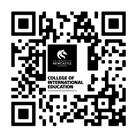
If you would prefer to live off campus, we have dedicated Accommodation Officers to help international students find a place to live, including advice on current rooms, apartments and houses available to rent.
The Australian Homestay Network is our preferred provider for our students. Homestay is an excellent option for living with local families in a home environment. Your host family provides not only accommodation, a furnished room, and daily meals, but also a great opportunity to practise your language skills at home and can help ease the transition into Australia and Newcastle.
Want to see what life on campus is like? Follow our social channels: @Uni Newcastle Residents
Award winning
2019 Excellence in Customer Service Award1 and Excellence in Sustainable Development Goals (2022)

Leadership opportunities
We employ at least 70 students every year through Student Living
Safe and secure 24 hours / 7 days a week security on site and free security shuttle
Study support
Dedicated study spaces and mentor-run sessions
Health and wellbeing support
Counselling, access to a dedicated mental health clinician, and wellbeing resources
Residential mentors
Support from fellow students living on campus
3 types of living environments
Lifestyle, Gender, and General
ResLife program
Award-winning program of social activities2


Before granting a student visa, the Australian Government Department of Home Affairs – Immigration and Citizenship will require you to show or declare that you have enough funds to pay for your expenses while in Australia. The Australian Government requires international students have a minimum of A$21,041 to stay in Australia for 12 months1
The good news is that Newcastle is more affordable when compared with most Australian capital cities across categories including groceries, leisure activities and accommodation*.
For accommodation, Newcastle is:
41% cheaper than Sydney
6% cheaper than Melbourne
17% cheaper than Brisbane
#Prices sourced from Cost of Living comparisons at budgetdirect.com.au


Accommodation
A$183 - A$403.50 (self-catered)
A$243 - A$483.50 (incl. 5-7 meals) (per
# Percentages were correct at the time of printing, please check online for up-to-date information.
1 The Department of Home Affairs has financial requirements international students must meet in order to receive a student visa for Australia. As of October 2019 the 12-month living costs are; A$21,041 for students and guardians, A$7,362 for partners coming with you and A$3,152 for a child coming with you. Education and Living Costs in Australia, Australian Government.
^ Transportation costs will vary depending on actual distance from accommodation to campus
The costs above represent a range depending on individual living preferences or location (Newcastle, Central Coast, or Sydney). More detailed accommodation information is available via QR code. All costs above are in AUD and are provided as a guide only. On-campus costs are based on 2022 rates and for a standard stay contract. These are subject to change. For the most up-to-date fees, please visit our website.
* Homestay for other campuses available and accommodation fees vary.
The University of Newcastle offers safe, friendly and secure campuses with a range of innovative facilities for you to make the most of your study experience in Australia. You will learn from world-class educators and interact with local and international students and experience the Australian culture and way of life. Check out our campuses.

Our Newcastle Callaghan campus, located on Awabakal land, is a central hub for education, humanities, social science, and the fields of science, technology, engineering, mathematics, and medicine (STEMM), as well as nursing and health. The region’s largest hospitals, the Hunter Medical Research Institute, schools, early childcare facilities, and local defence and industrial hubs are all in close proximity. With all this on your doorstep, you will have plenty of chances to meet industry leaders and build practical skills. Also located at our Newcastle (Callaghan) campus, NUsport at The Forum offers state-of-the-art health and fitness facilities and programs to help maintain your physical and mental wellbeing.

In the heart of the CBD, our Newcastle City campus, found on Awabakal and Worimi lands, provides an integral link with industry in creativity, business and law. Home to the University of Newcastle School of Law and Justice and Newcastle Business School, NUspace harnesses the latest in technology and innovation to deliver a world-class student experience. Immerse yourself in the marketing lab, explore our Greater Bank Finance Lab or find yourself in a moot court experienceopportunities are endless.
Overlooking Newcastle harbour, Q building is home to our Creative Industries programs within our School of Humanities, Creative Industries and Social Sciences, as well as our Integrated Innovation Network (I2N) Hub. Enrich your learning experience with specialised studios and technologies, and shared spaces to connect with staff, industry, and community.
Located just a few minute’s walk from Q building, NUsport at The Forum Harbourside offers leading health and fitness facilities in a convenient location, so you can stay healthy while you study.
Our Sydney campus, located on Eora land, in the middle of Sydney’s central business district, offers world-class facilities and innovative styles of learning. A range of postgraduate programs are offered at this campus including Information Technology, Business Administration and Professional Accounting. The courses have been developed by industry professionals and include applied learning to better prepare students for actual industry settings. Both the campus and programs are designed to meet the business needs of today, so that students can solve the challenges of tomorrow.
More than A$125 million invested into the Newcastle City campus over the past five yearsNewcastle Callaghan campus
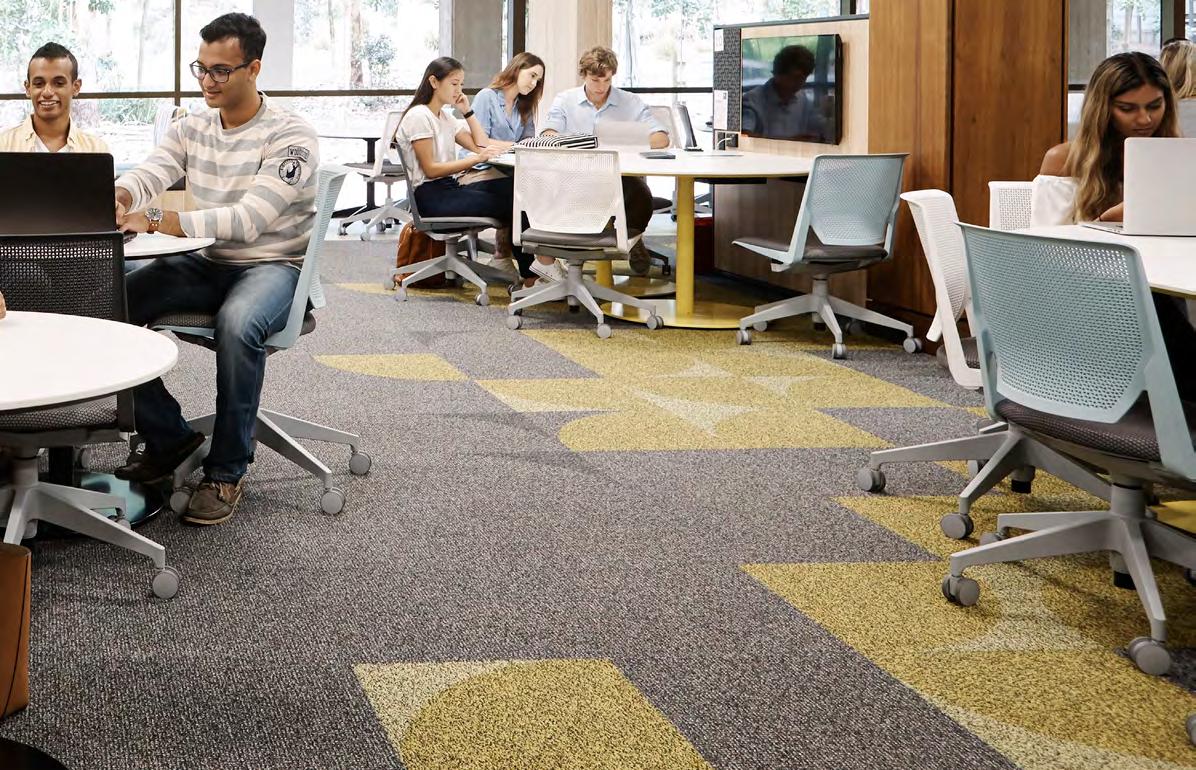
Only an hour drive from Newcastle or Sydney, our Central Coast campus at Ourimbah, found on Darkinjung land, offers study programs in business, education, humanities and social science, oral health therapy, podiatry and science (food and human nutrition, coastal and marine, environmental management, and exercise and sport science).
Strategically located on the grounds of Gosford Hospital, our world-class University of Newcastle Central Coast Clinical School, found on Darkinjung land, has transformed the region into a leader in health, research, innovation and education.
Our state-of-the-art facility offers an immersive learning environment with a three ward simulation centre, anatomy and histology laboratory, research laboratories, virtual reality spaces and more.
Our students benefit from strong links with local industry and partnerships with the Central Coast Local Health District for nursing and specialised health degrees.


On campus you’ll have plenty of opportunities to have fun, meet new people, make lifelong friends and experience new things.
newcastle.edu.au/campuslife
Whether you’re looking for a good coffee to kickstart your day, a bite to eat or a place to relax in between classes, we’ve got you covered. You’ll be able to choose from a wide range of cafés, food outlets and bars across all our campuses. And you don’t have to venture too far to catch some of the world’s biggest musicians and bands. Chances are you’ll find a gig at Callaghan’s Bar on the Hill, one of the many venues close to the Newcastle City campus, or further down the coast at The Beery in Terrigal.

No matter which campus you study at, there’s always something happening during the semester. From Orientation to Autonomy Party and plenty of events in between, there’s no shortage of social activities. Take part in study workshops, get involved in health and fitness programs, attend presentations from international scholars, or simply kick back and enjoy watching a movie by moonlight.
The University is home to over 150 clubs, societies and social groups who are always looking for new members. Are you a budding basketballer? Art appreciator? Diver? Dancer? Anime enthusiast? Be part of something new, something exciting. Challenge yourself, or just have fun. unsa.org.au/clubs



Great health and fitness facilities await you at The Forum University (Callaghan campus) and Harbourside (Newcastle City campus). You’ll find a 50m indoor heated swimming pool, extensive group fitness options and state-of-the-art strength and cardio equipment. Indoor courts provide for casual hoops and structured social sport competitions all year. Join one of many sporting clubs or compete in the representative inter-University competition –UniSport Nationals.
theforum.org.au
There are plenty of outdoor spaces with sporting fields, shared paths and dedicated fitness trails on campus. You will find yourself playing football at Callaghan campus to beach volleyball at the Nobby’s beach, just a 20 minute walk from our NUspace campus.
Access via train is available for both Callaghan (Warabrook station) and Central Coast (Ourimbah station) campuses. If you’re studying at our Newcastle City or Honeysuckle campuses, the Newcastle Light Rail’s Civic stop is right at our doorstep.
Beautiful bike paths make riding around campus fun, and our bike hubs at Callaghan and Newcastle City campuses offer showers and secure storage.
A free shuttle bus loops around Callaghan campus to get you to and from class and runs between our Callaghan and Newcastle City campuses every 30 minutes during semester.
An after-hours, on-call security shuttle is also available at Callaghan campus. The shuttle can take you back to your car or to Warabrook train station and surrounding suburbs.
We offer several additional services across our campuses to make student life easier including:
• ATMs
• medical centre and pharmacy
• post office
• book shop and other retailers
• childcare
• counselling newcastle.edu.au/services

Located in the heart of the city, NUspace is only a short walk away from the stunning beaches, the main shopping precinct and the heart of entertainment in Newcastle.
You can meet with our Student Experience team at any time to discuss any challenges or concerns that may arise.
What can the Student Experience team do for you?
Connect you with academic support
• Provide you with program and enrolment advice
• Assist with degree choices and course selection
• Provide welfare support for personal issues (including confidential counselling)
• Help you manage your time and deal with study pressures
• General study and motivation assistance
• Help with accommodation – homestay, on-campus and off-campus
• Support for students under the age of 18
• Connect you with clubs, societies and peers to help you build your social networks

We have students from all over the world, and to ensure you have the best opportunity to reach your potential our tutorial support sessions are part of your study program. Ask your Student Experience Team for more details.
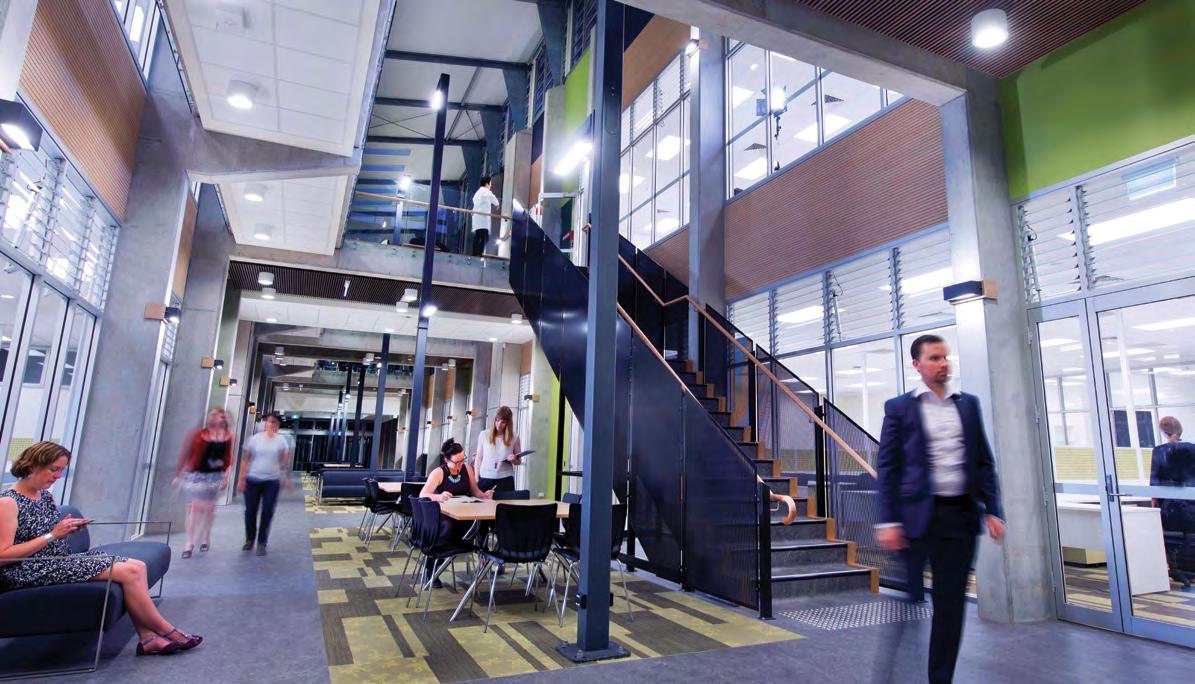
With NUspace being in the heart of the city, our students are able to take advantage of the educational, recreational and social facilities in and around the University building. Students can meet at NUspace Cafe or Darks Coffee. They can also join the University-run NUmates program to develop friendships with other international students.

The Student Experience Team organises regular events in and around the University for international students to broaden their experience, enhance their social networks and provide support and guidance to other internationals.
Computer suites and wireless internet are available to all College students. There are a number of computers available to use anytime at each campus.
The main library is in the city campus NUspace, located on the first floor. Our students have access to all its resources, systems and support services. If you are on a different campus, you will still have access to the full service and resources of the library. Find out more at newcastle.edu.au/library.
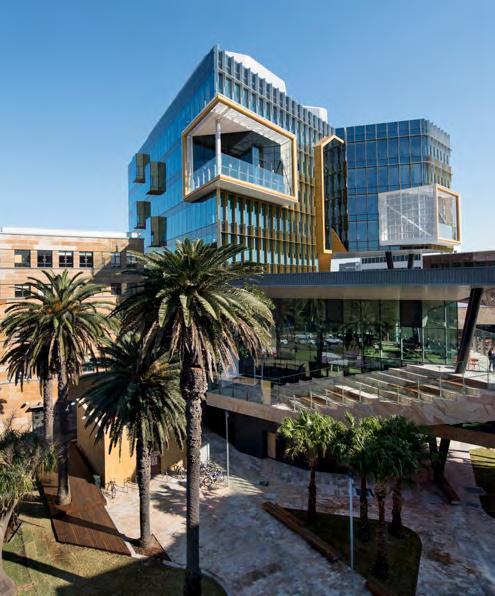

CRICOS Code 104602J
Intake Duration
Our Foundation Studies Program is your pathway to over 130 bachelors’ degrees at the University of Newcastle!
As part of the program, you’ll study a total of eight courses and, upon successful completion, progress to Year 1 of your selected bachelor’s degree at the University.
Applicants who successfully receive a Letter of Offer will have a packaged offer which includes both Foundation Studies and their chosen degree program in the same offer. Once the offer is accepted and deposit paid, electronic Confirmation of Enrolment (eCOE) documents are provided for both programs (including Health Science quota programs), allowing students to secure a visa for the full duration of their study.
Our Foundation Studies have been specifically designed to boost your qualifications and bridge any gaps in your academic preparation and English language proficiency.
Studying with us, you’ll enjoy small class sizes in a caring and supportive environment, to help prepare you for a successful transition to the University of Newcastle.
Bachelor’s degree
26 February 12 months All degrees
24 June 8 or 12 months All degrees
21 October 8 months
Program Fee* $27,200
COURSE STRUCTURE
Four core courses
• English for Academic Purposes
All degrees with a mid-year intake
• Introduction to Academic Communication
IT for Academic Studies
• Australian Studies
Four of the following electives based on bachelor’s degree destination:
Business & Commerce Stream
• Accounting
• Economics
Legal Studies
• Introductory Mathematics
Education, Arts & Communication Stream
Introduction to Media
• Media Production
• Legal Studies
Introductory Mathematics
Engineering, Science & IT Stream
Computer Science
Mathematics for Science & Engineering
• Chemistry
• Introductory Mathematics
Introduction to Media
• Media Production
Health Science Stream
• Biology
• Chemistry
Human Biology
• Introductory Mathematics
The following is the full list of average mark (percentage score) student requirements:

Students who would like to enter the Bachelor of Medical Science & Doctor of Medicine program, but don’t meet the direct entry requirements, have the opportunity to secure a place through our exclusive Foundation Studies in Medicine program pathway.
What makes our program different?
• Our Letter of Offer is packaged and contains both the Foundation Studies in Medicine and the Bachelor of Medical Science & Doctor of Medicine in the one offer.
• If you accept an offer with us, you will receive the Electronic Confirmation of Enrolment (eCoE) for the Bachelor of Medical Science & Doctor of Medicine as well as Foundation Studies in Medicine.
• The University of Newcastle has extra quota places in the medical degree reserved exclusively for our Foundation Studies in Medicine students.
• Achieving a percentage score of 90 and above in our Foundation Studies program guarantees you a spot in the Multiple Skills Assessment (interview).
• High progression rate.
• Foundation Studies in Medicine students are exempt from having to sit UCAT.
We are the only international pathway provider in Australia to offer this program
High
COURSE STRUCTURE
Eight core courses
• English for Academic Purposes
• Introduction to Academic Communication
• IT for Academic Studies
• Australian Studies
• Biology Chemistry
Human Biology Introductory Mathematics

Our brand new Express Preparation Program (EPP) has been designed for applicants who have completed Year 12 of high school, but have not met the academic and/or English proficiency required for direct entry to a Bachelor program at the University.
You can complete this full-time, one-trimester program (14 teaching weeks) and progress to Year 1 of over 130 different Bachelor programs of your choice at the University of Newcastle.
To successfully progress to your chosen Bachelor program, you will need the same Average Score as Foundation Studies students; however the score is only calculated over four courses (pages 23 - 26).
Year 1, The University of Newcastle Year 12 High School Express Preparation Program
•
•
•

Our range of Degree Transfer programs are designed for students who have completed 12 years of schooling in their home country, and offers a direct pathway into the second year of their chosen bachelor’s degree at the University of Newcastle. They are available in six different streams: Business, Commerce, Design (Architecture), Construction Management, Engineering, and Information Technology.
A Degree Transfer program can be packaged with one of 35 different bachelor’s degrees at the University.
• Enjoy access to all the same facilities and services as University of Newcastle students from day one.
• Study the Year 1 curriculum of your bachelor’s degree in a supportive small-class environment.
• Boost your language and communication skills with Academic English.
• Attend Year 1 University lectures and tutorials. Also, you will receive additional tutorial support to guide your studies.
Year 2, The University of Newcastle High School (Year 12) Degree Transfer (CIE)CRICOS code 104604G
Intakes 26 February, 22 July or 21 October
Duration 12 months
Program Fee* $31,000
COURSE STRUCTURE
Nine core courses
ACFI1001 Accounting for Decision Makers
ACFI1003 Introduction to Finance
ECON1001 Microeconomics for Business Decisions
LEGL1001 Foundations of Law
MKTG1001 Foundations of Marketing
MNGT1001 Introduction to Management
Academic English A
• Academic English B
• STAT1060 Business Decision Making
One elective course from the following:
• MNGT1002 Introduction to Entrepreneurship & Innovation
• BUSA1001 Introduction to Business Information Systems
Second year entry to your choice of nine bachelor’s degrees:
• Bachelor of Business (Entrepreneurship & Innovation)
• Bachelor of Business (International Business)
• Bachelor of Business (Human Resource Management)
• Bachelor of Business (Leadership & Management)
• Bachelor of Business (Marketing)
• Bachelor of Business (Politics & International Relations)
Bachelor of Business Analytics
Bachelor of Business/Bachelor of Business Analytics
Bachelor of Business/Bachelor of Innovation & Entrepreneurship
CRICOS code 104606E
Intakes 26 February, 22 July or 21 October
Duration 12 months
Program Fee* $31,000
COURSE STRUCTURE
Ten core courses
• ACFI1001 Accounting for Decision Makers
• ACFI1002 Accounting Practice
• ACFI1003 Introduction to Finance
• ECON1001 Microeconomics for Business Decisions
• ECON1002 Macroeconomics in the Global Economy
LEGL1001 Foundations of Law
MNGT1001 Introduction to Management
Academic English A
Academic English B
STAT1060 Business Decision Making
Second year entry to your choice of six bachelor’s degrees:
• Bachelor of Commerce (Accounting)
• Bachelor of Commerce (Economics)
• Bachelor of Commerce (Finance)
• Bachelor of Commerce/Bachelor of Innovation and Entrepreneurship
Bachelor of Business/Bachelor of Commerce
Bachelor of Commerce/Bachelor of Business Analytics
Top 175 in the world for Business and Economics (TIMES Higher Education Subject Rankings 2023)
91.1% employed within four months of graduating (Graduate Outcomes Survey 2019-2021Undergraduate Business and Management)
* Fees stated are for 2024 and are in AUD. Additional fees apply. Please visit internationalcollege.newcastle.edu.au/fees.html for more information.


Top 150 in the world for Architecture and the Built Environment (QS World University Rankings by Subject 2023)
No. 1
in NSW for full-time employment and median salary (Undergraduate Architecture) (Course Experience Questionnaire 2020 – 2021 –Undergraduate Architecture and Built Environment)
COURSE STRUCTURE
Ten core courses
• ARBE1101 Construction Technology 1
• ARBE1102 Construction Ecology 1
• ARBE1103 Digital Communication in the Built Environment
• ARBE1301 Construction Law and Legislation
• ARBE1304 Building Codes and Compliance
• ARBE1305 Construction Technology, Sequencing and Representation
• ARBE1306 Construction Management Fundamentals
• ARBE1201 Visual Communication in the Built Environment
• ICEN7101 Academic English A
• ICEN7102 Academic English B
Second year entry to Bachelor of Construction Management (Building) (Honours)

No. 3
in Australia for for overall satisfaction (Course Experience Questionnaire 2020 – 2021 –Undergraduate Architecture and Built Environment)
CRICOS Code 113050F Intake
COURSE STRUCTURE
Eight core courses
• ARBE1102 Construction Ecology 1
• ARBE1201 Visual Communication in the Built Environment
• ARBE1222 Architecture Studio 1
• ARBE1103 Digital Communication in the Built Environment
• ARBE1104 History and Theory in the Built Environment 1
ARBE1220 Architecture Studio 2
• ICEN7101 Academic English A
• ICEN7102 Academic English B
Second year entry to Bachelor of Design (Architecture)
CRICOS code 104608C
Intakes 26 February, 22 July
Duration 12 months
Program Fee* $35,000
COURSE STRUCTURE
Six core courses
• ENGG1003 Introduction to Procedural Programming
ENGG1500 Introduction to Professional Engineering
MATH1110 Maths for Engineering, Science and Tech 1
• MATH1120 Maths for Engineering, Science and Tech 2
• Academic English A Academic English B
Four directed courses from the following (depending on chosen degree):
CIVL1100 Fundamentals of Engineering Mechanics
CIVL1200 Earth Systems
ELEC1310 Introduction to Electrical Engineering
• ELEC1710 Digital and Computer Electronics 1
• ENGG2500 Sustainable Engineering Practice
• HUBS1105 Musculoskeletal Anatomy
• HUBS1109 Anatomy for Biomedical Science
• HUBS1420 Professional & Communication Skills in Biomedicine
• MECH1110 Mechanical Drawing/CAD and Workshop Practice
• MECH1750 Engineering Materials 1
• PHYS1205 Fundamentals of Engineering Physics
• PHYS1210 Advanced Physics 1
• PHYS1220 Advanced Physics 2
• SENG1110 Object Oriented Programming
SURV1200 Introduction to Surveying
Second year entry to your choice of eleven bachelor’s degrees:
• Bachelor of Civil Engineering (Honours)
• Bachelor of Mechanical Engineering (Honours)
• Bachelor of Renewable Energy Engineering (Honours)
Bachelor of Mechatronics Engineering (Honours)
• Bachelor of Electrical & Electronic Engineering (Honours)
• Bachelor of Computer Systems Engineering (Honours)
• Bachelor of Surveying (Honours)
Bachelor of Medical Engineering (Honours)
• Bachelor of Chemical Engineering (Honours)
• Bachelor of Software Engineering (Honours)
• Bachelor of Environmental Engineering (Honours)
CRICOS code 104610J
Intakes 26 February, 22 July
Duration 12 months
Program Fee* $35,000
Four core courses
• COMP1140 Database and Information Management
SENG1110 Object Oriented Programming
Academic English A
• Academic English B
Six directed courses from the following:
• COMP1010 Computing Fundamentals
• ELEC1710 Digital & Computer Electronics 1
• ENGG1500 Introduction to Professional Engineering
INFT1004 Introduction to Programming
INFT1060 Cybersecurity Fundamentals
MATH1110 Maths for Engineering, Science and Tech 1
MATH1120 Mathematics for Engineering, Science & Technology 2
MATH1510 Discrete Mathematics
SENG1050 Web Technologies
• SENG1120 Data Structures
• STAT1060 Business Decision Making
• STAT1100 Data Wrangling & Visualisation
• STAT1300 Fundamentals of Statistics
Second year entry to your choice of seven bachelor’s degrees:
Bachelor of Information Technology
Bachelor of Information Technology (Business Technology)
• Bachelor of Information Technology (Systems Development)
• Bachelor of Information Technology / Bachelor of Business
• Bachelor of Computer Science
Bachelor of Data Science
• Bachelor of Data Science/Bachelor of Computer Science
Ranked 1 in Australia and Ranked 16 in the world for Automation and Control Engineering (ShanghaiRanking’s Global Ranking of Academic Subjects 2022)
Top 150 in the world for Civil and Structural Engineering (QS World University Rankings by Subject 2023)


If you don’t quite meet the academic and English proficiency requirements for the Degree Transfer program, you may have the option of Degree Transfer Extended which includes an extra bridging trimester prior to the Degree Transfer program.
Degree Transfer Extended is available for all streams available within the Degree Transfer Program: Business, Commerce, Design (Architecture), Construction Management, Engineering, and Information Technology.
Degree Transfer Construction Management (Building)
Degree Transfer Design (Architecture)
Degree Transfer Extended Business
Degree Transfer Extended Commerce
Degree Transfer Extended Construction Management (Building)
Degree Transfer Extended Design (Architecture)
Degree Transfer Extended Engineering
Degree Transfer Extended IT
CRICOS 113058J
CRICOS 113050F
CRICOS 104605F
CRICOS 104607D
CRICOS 113052D
CRICOS 113050E
CRICOS 104609B
CRICOS 104611H
Intake Duration
25 March
21 October
16 months
16 months
Program Fee* $37,500 Business, Commerce, Construction Management, Design (Architecture)
$42,300 (Engineering, Information Technology)
COURSE STRUCTURE
Five core bridging courses (non-credit bearing) in the first semester:
Business and Commerce Stream/Construction Management (Building) Stream/Design (Architecture)
Stream
• Academic English
Accounting
Economics
Commercial Law Fundamentals
Statistics
Information Technology & Computer Science Stream
Academic English
• Core Mathematics
• Programming
• Computing
• Statistics
Engineering Stream
Academic English
Core Mathematics
Engineering Mathematics
Computing
• Physics
Upon completion of the initial bridging trimester, students then proceed to the relevant Degree Transfer program and complete ten courses of study over 12 months before progressing to Year 2 of their chosen degree.

Our Pre-Master’s Program offers a direct pathway for international students wishing to study a range of master’s degrees at the University of Newcastle. Upon successful completion of the program, you will receive up to 30 credit points, allowing you to jump straight into the second trimester of your master’s degree.
The Pre-Master’s Program is taught over two trimesters. In the first Bridging trimester, you’ll develop your study and research skills, as well as English academic language in writing, reading, listening, and speaking. By the second Pre-Master’s trimester, you’ll begin studying university subjects that are part of your chosen master’s degree.
Why study the Pre-Master’s Program?
• Flexible entry and English language requirements (see entry requirements on page 48).
• Our Bridging to Pre-Master’s trimester model means you begin your master’s degree after just one trimester, and then upon completion of our Program, progress straight into the second trimester of your master’s degree at the University.
• Benefit from extra support to develop your English and academic study skills.
• Feel better prepared for university study, while only adding an additional four months to your degree.
CRICOS code 104612G
Program Fee* $36,360
The Pre-Master’s Program – Business, can be packaged with the following master’s degrees:
Master of Professional Accounting/Master of Business Administration (Sydney campus only)
Master of Applied Finance
• Master of Business Administration (Available in Newcastle/Sydney)
• Master of Business Administration (Global) (Available in Newcastle/Sydney)
• Master of Health Economics, Management & Policy
Master of Health Economics, Management & Policy (Global)
• Master of Health Economics, Management & Policy/Master of Business Administration
• Master of Human Resource Management
Master of International Business
• Master of Marketing
Master of Business Administration/Master of Applied Finance
• Master of Business Administration/Master of Human Resource Management
• Master of Business Administration/Master of Marketing
Master of Business Administration/Master of International Business
Upon graduating with a master’s degree in one of these business-related areas from the University of Newcastle, you’ll develop an understanding of business and the environments they operate in, and gain desirable skills such as strategic planning and project management. In an increasingly globalised and tech-driven world, business skills are highly versatile and growing in demand, allowing you to access opportunities across a wide range of fields and sectors.
Depending on your chosen degree, your career opportunities will be diverse, including:
Accountant
Finance/marketing/healthcare manager
Investment banker
• Management/business consultant
• Human resources officer/advisor
• Financial advisor
COURSE STRUCTURE
Trimester 1: Five core bridging courses (non-credit bearing)
• Academic English A
• Critical Thinking for Postgraduate Studies
• Intercultural Studies
• Quantitative Skills for Postgraduate Studies
• Study and Research Skills
Trimester 2: English and three credit-bearing courses
Academic English B
Three credit-bearing courses according to the program plan of your preferred Master’s degree.
CRICOS code 104612G
Program Fee* $18,180
The Pre-Master’s Program – Business (Accelerated) is a one trimester (four months) version of the Pre-Master’s Business Program for students with slightly higher academic and English proficiency levels. You will study Academic English and three master’s level subjects that are part of your chosen master’s degree. On successful completion of the Pre-Master’s Program Accelerated, you’ll receive credit for these subjects and jump straight into the second trimester of your degree.
English and three credit-bearing courses
• Academic English B
Three credit-bearing courses according to the program plan of your preferred Master’s degree.


CRICOS code 104613F
Program Fee* $36,360
The Pre-Master’s Program – Information Technology, can be packaged with the following master’s degrees:
Master of Information Technology (Business Analytics)
• Master of Information Technology (Management Information Systems)
Master of Information Technology (no specialisation)
All of the above degrees are available at either Newcastle Callaghan or Sydney campuses.
Upon graduating with a Master of Information Technology from the University of Newcastle, you will be capable of approaching complex problems with a level head, able to manage IT projects effectively and professionally, and have the technical expertise required to take on positions in electronic commerce, information systems, games development, technology management, health informatics or business systems and management.
Your career opportunities are quite diverse, including:
Business analyst
• Database developer
• Project manager Systems analyst
Web developer
• Software developer
COURSE STRUCTURE
Trimester 1: Five core bridging courses (non-credit bearing)
• Academic English A
• Critical Thinking for Postgraduate Studies
• Intercultural Studies
• Quantitative Skills for Postgraduate Studies
• Study and Research Skills
Trimester 2: English and three credit-bearing courses
• Academic English B
Three credit-bearing courses according to the program plan of your preferred Master’s degree.
1 Student Experience Survey, 2019.
CRICOS code 104613F
Program Fee* $18,180
The Pre-Master’s Program – Information Technology (Accelerated) is a one trimester (four months) version of the Pre-Master’s Program Information Technology, for students with slightly higher academic and English proficiency levels. You will study Academic English and three master’s level subjects that are part of your chosen master’s degree. Upon successful completion of the Pre-Master’s Program, you’ll receive 30 credit points and jump straight into the second trimester of your degree.
COURSE STRUCTURE
English and three credit-bearing courses
Academic English B
Three credit-bearing courses according to the program plan of your preferred Master’s degree.
These master’s degrees are available at either Newcastle or Sydney campuses after successful completion of the PreMaster’s Program – Information Technology (Accelerated): Master of Information Technology (Business Analytics)
• Master of Information Technology (Management Information Systems)
• Master of Information Technology (no specialisation)
No. 1
in Australia for graduate skill satisfaction in postgraduate Computing and Information Systems1
Ranked 1
in Australia for for median income level of graduates one year after graduation (Graduate Outcomes Survey 2019-2021Postgraduate Computing and Information Systems)
* Fees stated are for 2024 and are in AUD. Additional fees apply. Please visit internationalcollege.newcastle.edu.au/fees.html for more information.




“Thanks for the knowledge that I gained from the College, I haven’t had any difficulty (at the University). After I finished my Foundation Studies, I got the ASEAN Excellence Scholarship. I was very proud of myself, because I could bring some financial assistance to my family.”

Watch the video
“I enjoyed everyday studying at the College. I am now studying the Master of Marketing at the University of Newcastle. The University has many beautiful buildings, and I especially like the library. I can study in the library whole day.”
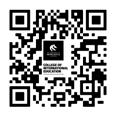
Watch the video
“The classes at the College help me come out of the box, doing fun and interactive things. The classes are quite small, maybe 18 - 20 students. It helped me make new friends. The teachers here are quite helpful and friendly. They are easy to communicate, give us personal and emotional support, and provide tutorial support classes if you are stuck in your studies.”
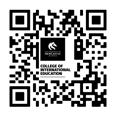

The University of Newcastle College of International Education is proud to offer our students some of the most competitive scholarships available in Australia.
We offer a range of scholarships towards the cost of our program tuition fees. These normally represent 5-20% of the total program fee. Our scholarships are awarded automatically and will be listed on your Letter of Offer, if eligible, and do not require a separate application. The exact amount awarded will depend on an applicant’s particular background, for example, the grades achieved in high school.
Students with a sibling who also enrols with The University of Newcastle College of International Education will be eligible for the Kaplan Family Bursary. The bursary provides 10% off the tuition fee of the second sibling to accept the offer and commence studies.
The following Scholarships provide a fee reduction of $10,000 per year –that’s worth up to A$50,000 !
The University of Newcastle College of International Education students from any of the 54 countries within Africa are eligible for the African Excellence Scholarship once they progress to their chosen degree at the University.
The University of Newcastle College of International Education students from Brunei, Cambodia, Indonesia, Laos, Malaysia, Myanmar, Singapore, Thailand, the Philippines, and Vietnam are eligible for the ASEAN Excellence Scholarship once they progress to their chosen degree at the University.
The University of Newcastle College of International Education students from Afghanistan, Bangladesh, Bhutan, India, Maldives, Nepal, Pakistan, and Sri Lanka are eligible for the South Asia Excellence Scholarship once they progress to their chosen degree at the University.
The University of Newcastle College of International Education students who are not eligible for citizenshipbased scholarships and who are onshore in Newcastle will be eligible for the Onshore Excellence Scholarship when they progress to their chosen degree at the University.

The following Scholarships provide a fee reduction of $15,000 per year.
The University of Newcastle College of International Education students from all countries who progress into any of the following degrees, are eligible for the International Excellence Scholarship (Information Technology and Computer Science) worth $15,000 per year.
• Bachelor of Data Science
Bachelor of Data Science/Bachelor of Computer Science
• Bachelor of Data Science/Bachelor of Mathematics
• Bachelor of Information Technology
Bachelor of Information Technology/Bachelor of Business
• Bachelor of Computer Science
Bachelor of Computer Systems Engineering (Honours)/Bachelor of Computer Science
• Master of Information Technology
The University of Newcastle College of International Education students from all countries who progress into any of the following degrees, are eligible for the International Excellence Scholarship (Management, Accounting and Finance) worth $15,000 per year.
• Master of Professional Accounting/Master of Business Administration
Master of Business Administration
• Master of Applied Finance
• Master of Business Administration/Master of Applied Finance
Master of Business Administration/Master of Human Resource Management
Master of Business Administration/Master of International Business
Master of International Business
Master of Business Administration/Master of Marketing
Master of Health Economics, Management, and Policy
• Master of Health Economics, Management, and Policy (Global)
• Master of Health Economics, Management, and Policy/Master of Business Administration
For more information about our scholarships please email: CIE@newcastle.edu.au.
Scholarships
 *Progression Scholarships are not applicable for certain Health Science programs with an international student quota.
*Progression Scholarships are not applicable for certain Health Science programs with an international student quota.

IELTS
iBT
If
57
If
50
SPM English 1119 with a min score of C-, C or C+
English 1119 with a min score of B-, B or B+
English 1119 with a min score of B-, B or B+
STPM N/A N/A N/A
GCSE / IGCSE English or English Language or English as a Second Language subject with a C grade
Academic Entry
Australia
Completion of Year 11 with pass grades Foundation Studies program from recognised Australian Universities/Colleges (incomplete)
Bangladesh Year 11 with GPA 3.0
Botswana International General Certificate of Secondary Education; or Botswana General Certificate of Education with a min C grade (pass with credit)
Brazil Titulo de Technico/ Auxiliar Tecnico; or Certificado de Conclusao de Ensino Medio/Segundo Grau with a GPA of 5.0
Canada Completion of Year 11 with pass grades
Cambodia Diploma of Upper Secondary Education with E grade average or Year 11 of the Cambodian Diploma of Upper Secondary Education with an overall grade average of 70%
Chile Completion of the Licencia de Educacion
China
Senior Middle 2 with 65% (including vocational schools)
English or English Language or English as a Second Language subject with a C grade
Successful completion of Year 12 or the Higher School Certificate and achieving a min average of 70% or above / ATAR of 80 or higher
Foundation Studies program from recognised Australian Universities/Colleges with 70% or above
Completion of the Higher School Certificate with GPA 4.0
English or English Language or English as a Second Language subject with a C grade
Completion of an Australian Higher School Certificate with 45% average
N/A N/A
Literature (920) with a min score of D-, D, D+
Literature (920) with a min score of D-, D, D+
N/A N/A
Completion of the Higher School Certificate with GPA 2.5
Not Accepted International General Certificate of Secondary Education; or Botswana General Certificate of Education with a min A grade (very good)
Certificado de Conclusao de Ensino Medio/Segundo Grau with a GPA of 7.5
Completion of Year 12 with an average of 70% or higher
Diploma of Upper Secondary Education with a B grade average
Certificado de Conclusao de Ensino Medio/Segundo Grau with a GPA of 6.0
Completion of Year 12 with an average of 55%
Diploma of Upper Secondary Education with a C grade average
Completion of an Australian Higher School Certificate with 40% average
Foundation Studies program from recognised Australian Universities/Colleges with 40% or above
Satisfactory completion of an Australian Higher School Certificate or equivalent / ATAR of 50 or higher
Foundation Studies program from recognised Australian Universities/Colleges with 50% or above
Completion of the Higher School Certificate with GPA 2.0
International General Certificate of Secondary Education; or Botswana General Certificate of Education with a min A grade (very good)
Certificado de Conclusao de Ensino Medio/Segundo Grau with a GPA of 5.5
Completion of Year 12 with an average of 50%
Diploma of Upper Secondary Education with D grade average
Completion of the Higher School Certificate with GPA 3.0
Not accepted
Completion of the Licencia de Educacion with an average of 6.0 or above
Senior Middle 3 with an average of 80% across 4 academic subjects
Completion of the Licencia de Educacion with an average of 5.0 or above
Senior Middle 3 with 55% (including vocational schools)
Completion of the Licencia de Educacion with an average of 4.0 or above
Senior Middle 3 with 50% (including vocational schools)
Certificado de Conclusao de Ensino Medio/Segundo Grau with a GPA of 6.5
Completion of Year 12 with an average of 60% or higher
Diploma of Upper Secondary Education with a C grade average
Completion of the Licencia de Educacion with an average of 5.5 or above
Senior Middle 3 with 65% (including vocational schools)
UNDERGRADUATE Foundation Studies
Colombia Bachillerato with 50% average
Fiji Year 12 Examination/ School Leaving Certificate with a min aggregate mark of 200 and 50% in English
Ghana
O Levels with "D" grade average Completion of the West African Senior School Certificate with min “D” average
Hong Kong SAR Completion of Form 5 with pass grades
India Year 11 with 50%
Foundation Studies in Medicine
Bachillerato with an average of 80%
Year 13 Certificate with a min aggregate mark of 300
O Levels with an A average (35pts) across 5 academic subjects
HKDSE total score of 12 points across 4 academic subjects (Category A). English paper not included
All India Senior School Certificate with an average of 70% across 3 academic subjects
Indonesia SMA II with 70% SMA III with 80% in academic subjects
International Completion of Year 1 IB
O Levels with D grade average
Japan
Kotogakko Year 2 with GPA 2.5
IB aggregate with 24pts over 6 subjects
O Levels with an A average (35 pts) across 5 academic subjects
A Levels with a B average across 3 academic subjects
Kotogakko Upper Secondary Certificate with GPA 4.0 or higher
Express Preparation Program Degree Transfer Extended – all programs
Degree Transfer – all programs
Bachillerato with 65% average Bachillerato with 60% average Bachillerato with an average of 70%
Year 13 Certificate with a min aggregate mark of 230
Year 13 Certificate with a min aggregate mark of 200
Year 13 Certificate with a min aggregate mark of 250
A Levels with 1 pass grade A Levels with 1 pass grade A Level with 2 pass grades
HKDSE with 6 points (best 4 academic subjects)
HKDSE with 4 points (best 4 academic subjects)
ISC or CBSE Year 12 with 52% across 4 academic subjects, or India State Board Year 12 with 57% across 4 academic subjects
ISC or CBSE Year 12 with 50% across 4 academic subjects, or India State Board Year 12 with 55% across 4 academic subjects
SMA III with 55% in academic subjects SMA III with 50% in academic subjects
IB aggregate with 19pts over 6 subjects
A Levels with 1 pass grade
AS Levels with 2 B and 1 C grades
Kotogakko Upper Secondary Certificate with GPA 2.4
IB aggregate with 18pts over 6 subjects
A Levels with 1 pass grade
AS Levels with 3 C grades
HKDSE with 8 points (best 4 academic subjects)
ISC or CBSE Year 12 with 55% across 4 academic subjects, or India State Board Year 12 with 60% across 4 academic subjects
SMA III with 60% in academic subjects
IB aggregate 21pts over 6 subjects
A Levels with 2 pass grades AS Levels with 3 B grades
Kotogakko Upper Secondary Certificate with GPA 2.0
Kotogakko Upper Secondary Certificate with GPA 2.8 or higher
Kenya Year 11 KCSE with D average KCSE with B average KCSE with D average KCSE with D average KCSE with C average
Korea
Completion of Senior Year 2 with pass grades
Completion of Senior High School Year 3 with 60% CSAT (English, Maths, Korean History plus 2 science subjects) Level 3 in all subjects
Completion of Senior High School Year 3 with 55% CSAT –minimum Level 6 scores in all subjects
High School Graduation Equivalency Examination with a min score of 55 in each exam
Completion of Senior High School Year 3 with 50% CSAT –minimum Level 6 scores in all subjects
High School Graduation Equivalency Examination with a min score of 50 in each exam
Completion of Senior High School Year 3 with 60% CSAT –minimum Level 5 scores in all subjects
High School Graduation Equivalency Examination with min score of 60 in each exam
Kuwait Completion of Shahadat AlThanawaya Al-Aama (General Secondary Education Certificate) with minimum overall grade 60%
Completion of Shahadat AlThanawaya Al-Aama (General Secondary Education Certificate) with a 85% average
Completion of Shahadat AlThanawaya Al-Aama (General Secondary Education Certificate) with a 70% average
Completion of Shahadat AlThanawaya Al-Aama (General Secondary Education Certificate) with a 65% average
Completion of Shahadat AlThanawaya Al-Aama (General Secondary Education Certificate) with a 75% average
UNDERGRADUATE
Laos
Macau
Upper Secondary School (Baccalaureat) mark 5.0 or higher
Senior Middle 2 with 60% average
Malaysia Completion of Form 5 with pass grades
Completion of SPM with pass grades
Completion of UEC (Senior Middle 2) with pass grades
Mauritius O Levels with D grade average
Myanmar Completion of Basic Education High School Exam
Namibia Namibia Senior Secondary Certificate (Ordinary Level) with a D grade average
Nepal Year 11 HSC with 50% average
Grade XI School Leaving Certificate with GPA 2.4
New Zealand
Nigeria
Oman
Completion of Year 12 (Form 6) with pass grades or NCEA Level 2 with 80 credits
O Levels with D grade average
Completion of the West African Senior School Certificate with min “D” average
Completion of General Secondary Education Certificate with 60% average
Pakistan HSC Year 11 with 55% average
Intermediate/Higher Secondary School Certificate 45% average overall
Upper Secondary School (Baccalaureat) mark 7.0 or higher
Senior Middle 3 with 75% (across 4 subjects)
SPM/O Levels with a minimum A average (35 pts) across 5 academic subjects or Senior Middle 3 with a 80% average across 4 relevant subjects
O Levels with an A average (35pts) across 5 academic subjects
Completion of Basic Education High School Exam with grade of 60% in final year results
Namibia Senior Secondary Certificate (Higher Level) with a GPA of 2.0/4.0
Upper Secondary School (Baccalaureat) mark 5.3 or higher
Senior Middle 3 with 50% (across 4 subjects)
STPM with 2 pass grades
UEC with passes in a minimum of 4 academic subjects (C grade average, 28 pts)
A Levels with 1 pass grade
Completion of Basic Education High School Exam with grade of 45% in final year results
Namibia Senior Secondary Certificate (Higher Level) with a GPA of 3.0
Upper Secondary School (Baccalaureat) mark 5.5 or higher
Senior Middle 3 with 55% (across 4 subjects)
STPM with 1 pass grade
UEC with passes in a minimum of 3 academic subjects (C grade average, 24 pts)
A Levels with 1 pass grade
Completion of Basic Education High School Exam with grade of 40% in final year results
Namibia Senior Secondary Certificate (Higher Level) with a GPA of 4.0/4.0
Upper Secondary School (Baccalaureat) mark 6.0 or higher
Senior Middle 3 with 65% (across 4 subjects).
STPM with 2 pass grades
UEC with a minimum of 4 academic subjects (C grade average, 32 pts)
A Level with 2 pass grades
Completion of Basic Education High School Exam with grade of 50% in final year results
Namibia Senior Secondary Certificate (Higher Level) with a GPA of 3.0/4.0
Year 12 HSC with 60% average Year 12 HSC with 55% average Year 12 HSC with 50% average Year 12 HSC with 60% average
NCEA Level 3 with a min 42 credits across 3 University approved subjects
O Levels with an A average (35 pts) across 5 academic subjects
General Secondary Education Certificate or American High School Diploma average grade of 85% in final year results
Cambridge O Levels with an A average (35 pts) across 5 academic subjects or Intermediate Certificate or Higher Secondary Certificate with a 90% average (A+) in the Premedical stream
Completion of Year 13 with passing grades or NCEA Level 3 with 28 credits
A Levels with 2 pass grades
Completion of Year 13 with passing grades or NCEA Level 3 with less than 32 credits
NCEA Level 3 with a min 32 credits across 3 University approved subjects
A Levels with 1 pass grade A Level with 2 pass grades
General Secondary Education Certificate or American High School Diploma average grade of 70% in final year results
Intermediate/ Higher Secondary School Certificate 53% average across 4 academic subjects
General Secondary Education Certificate or American High School Diploma average grade of 65% in final year results
Intermediate/Higher Secondary School Certificate 50% average across 4 academic subjects
General Secondary Education Certificate or American High School Diploma average grade of 75% in final year results
Intermediate/Higher Secondary School Certificate 55% average across 4 academic subjects
Philippines Year 11 Senior High School with overall average grade of 75% or higher in academic subjects or successful completion of Year 12
Qatar
Saudi Arabia
General Secondary Education Certificate (Shahadat AlThanawaya Al-Aama) with 65% average; or Qatar Senior School Certificate with a 650 grade average
Completion of the General Certificate of Secondary Education with an average of 50%
Singapore O levels with D grade average
N levels (academic stream only) with grade 4 average across 5 subjects
ITE Certificate/ Higher National ITE Certificate with GPA under 2.5
South Africa Year 11 of the National Senior Certificate with a 50% average
Sri Lanka O levels with D grade average
Taiwan (China)
Senior Middle 2 with 60% average in 4 subjects
Tanzania Certificate of Secondary Education with a Division I, II or III
Thailand Mayatom 5 with GPA 2.5
Türkiye High School Diploma (Lise Diplomasi)with a min 50pt average (pass)
United Arab Emirates Completion of General Secondary Education Cetificate or American High School Diploma with pass grades
average
Not Accepted
General Secondary Education Certificate with an average of 85% or better
Cambridge O Levels with an A average (35 pts) across 5 academic subjects
A Levels with a B average across 3 academic subjects
ITE Certificate/ Higher National ITE Certificate with GPA 2.5 or above
National Senior Certificate with a 70% average
Cambridge O Levels with an A average (35 pts) across 5 academic subjects
Completion of Senior High School with 75% (across 4 subjects)
Advanced Certificate of Secondary Education in Division I
Matayom 6 with a GPA of 3.0 or higher
High School Diploma (Lise Diplomasi) with a min 85pt average (excellent)
General Secondary Education Certificate or American High School Diploma average grade of 80%
General Secondary Education Certificate (Shahadat AlThanawaya Al-Aama) with 85% average; or Qatar Senior School Certificate with a 900-grade average
General Secondary Education Certificate with an average of 70% or better
A Levels with 1 pass grade
AS Levels with 3 C grades
ITE Certificate/ Higher National ITE Certificate with GPA 2.5 or above
National Senior Certificate with a 45% average
A Levels with 1 pass grade
Sri Lankan A Levels with 2 D grades
Completion of Senior High School with 60% (across 4 subjects)
Advanced Certificate of Secondary Education in Division I
Matayom 6 with GPA of 1.5
High School Diploma (Lise Diplomasi) with a min 65pt average (satisfactory)
General Secondary Education Certificate or American High School Diploma average grade of 65%
"General Secondary Education Certificate (Shahadat AlThanawaya Al-Aama) with 80% average; or Qatar Senior School Certificate with a 800 grade average"
General Secondary Education Certificate with an average of 65% or better
A Levels with 1 pass grade
AS Levels with 3 C grades
ITE Certificate/ Higher National ITE Certificate with GPA 2.5 or above
National Senior Certificate with a 40% average
A Levels with 1 pass grade
Sri Lankan A Levels with 2 E grades
Completion of Senior High School with 55% (across 4 subjects)
Advanced Certificate of Secondary Education in Division III
Matayom 6 with GPA of
High School Diploma (Lise Diplomasi) with a min 60pt average (satisfactory)
General Secondary Education Certificate or American High School Diploma average grade of 60%
average
Not accepted
General Secondary Education Certificate with an average of 75% or better
A Levels with 2 pass grades
AS Levels with 3 B grades
Polytechnic Diplomas with GPA 1.5
ITE Certificate/ Higher National ITE Certificate with GPA 3.0 or above
National Senior Certificate with a 50% average
A Levels with 2 pass grades
Sri Lankan A Levels with 2 pass grades
Completion of Senior High School with 65% (across 4 subjects)
Advanced Certificate of Secondary Education in Division I or II
High School Diploma (Lise Diplomasi) with a min 70pt average (good)
General Secondary Education Certificate or American High School Diploma average grade of 70%
UNDERGRADUATE
Foundation Studies
Uganda Uganda Certificate of Education with a Division I, II or III
United Kingdom
United States of America
GCSE (O Levels) with a D grade average (3 pts per subject average)
Completion of Year 11 with GPA 2.0
Vietnam Year 11 with a minimum GPA 6.0
Global
Zambia
Successful completion of the General Certificate of Education with a credit average
GCE O Levels (via private school) with D grade average
Zimbabwe O Levels with D grade average
Foundation Studies in Medicine
Uganda Advanced Certificate of Education with a B grade average
GCSE (O Levels) with an A average (35 pts) across 5 academic subjects
High School Diploma with a GPA of 3.0 or higher
Diploma of General Education with an average grade of 8
GCE A levels (via private schools) with a min B average across the best 3 academic subjects
Express Preparation Program
Uganda Advanced Certificate of Education with a C grade average
A Levels with 1 pass grade
AS Levels with 2 B grades and 1 C grade
Completion of USA High School Diploma with a GPA of 2.5
Year 12 with a GPA of 5.2
Degree Transfer Extended – all programs
Uganda Advanced Certificate of Education with a D grade average
A Levels with 1 pass grade
AS Levels with 3 C grades
Completion of USA
High School Diploma with a GPA of 2.0
Year 12 with a GPA of 5.0
Degree Transfer – all programs
Uganda Advanced Certificate of Education with a C grade average
A Levels with 2 pass grades
AS Levels with 3 B grades
Completion of USA
High School Diploma with a GPA of 2.75
Year 12 with a GPA of 5.5
A levels with a min B average across the best 3 academic subjects
GCE A levels (via private schools) with 1 pass grade
GCE AS Levels (via private school) with 2 B and 1 C grades
A Levels with 1 pass grade
AS Levels with 3 C grades
GCE A levels (via private schools) with 1 pass grade
GCE AS Levels (via private school) with 3 “C” grades
A Levels with 1 pass grade
AS Levels with 3 C grades
GCE A levels (via private schools) with 2 pass grades
GCE AS Levels (via private school) with 3 “B” grades
A Levels with 2 pass grades
AS Levels with 3 B grades

PTE
KITE
Main flight score of 400, speaking and writing score min 400 each
Main flight score of 430, speaking and writing score min 420 each HKDSE
Academic Entry
All countries
Bangladesh
2 year Diploma (AQF5 equivalent), plus 1 year’s relevant organisational experience; or 3 year undergraduate qualification
3 or 4 year Bachelor degree (Pass or Honours) from a recognised institution
Bhutan Higher National Diploma or 3 year Bachelor degree from a recognised institution
Botswana Higher Diploma or 4 year Bachelor degree from a recognised institution
Brazil
Cambodia
Canada
Cameroon
Mainland China
3 year Licenciado/Licenciatura from a Public Institution; or 4yr Licenciado/Licenciatura from a Higher Education Institution
N/A
4 or 5 year Bachelor degree (Pass or Honours) in a professional field from a recognised institution
4 or 5 year Bachelor degree (Pass or Honours) from a recognised institution awarded after 2015
4 year Bachelor degree from The University of Botswana
4 year Bacharel/Bacharelado Licenciado/ Licenciatura from a Public Institution; or 5 year Bacharel/Bacharelado, Licenciado/ Licenciatura or Título Profissional from a Higher Education Institution
Bachelor degree from a recognised institution Completion of a Doctor of Medicine
3-year postsecondary Diploma or an Associate Degree from a recognised institution
Bachelor degree or Licence from a recognised institution
3 or 4 year Graduation Certificate from a recognised institution
Egypt Bachelor degree from a recognised higher institute or university
Fiji 3 year Advanced Diploma; or 3 year Higher National Diploma
Ghana Higher National Diploma from a recognised institution
Hong Kong SAR
India
Indonesia
Higher Certificate, Higher Diploma and Associate Degree from a recognised institution
3 year Diploma after completion of Year 12 or a Bachelor degree from a recognised institution
4 year Sarjana (S1)/Bachelor degree from a recognised institution
Japan Postsecondary Diploma from a recognised institution
Jordan Community College Diploma from a recognised institution
Kenya Higher Diploma from a recognised institution
Korea, South
2 year or more Associate Degree from a recognised institition
Kuwait Bachelor degree from a recognised institution
Bachelor degree from a recognised institution
Bachelor degree or Licence from a recognised institution
4 year Bachelor degree awarded according to the Regulations Concerning Academic Degrees in the People's Republic of China from a Section 1 or 2 institution
Bachelor degree from a recognised university
3 year Bachelor degree from a recognised institution
Bachelor degree from a recognised institution
Bachelor degree from a recognised institution
Bachelor degree from a recognised institution
4 year Sarjana (S1)/Bachelor degree from a recognised institution
Bachelor degree from a recognised institution
Bachelor degree from a recognised institution
Bachelor degree from a recognised institution
Bachelor degree from a recognised institution
Bachelor degree from a recognised institution
Laos
Pre-Master’s Program
Pre-Master’s Program Accelerated
Bachelor degree from a recognised institution Completion of a Doctor of Medicine
Lebanon Diplome Universitaire de Technologie from a recognised institution
Macau SAR Diploma de Bacharelato (Higher Diploma) undertaken at Institute for Tourism Studies, University of Macau SAR, or Macao Polytechnic Institute
Bachelor degree or Licence from a recognised institution
Licenciatura (Bachelor degree) from a recognised institution
Malaysia Postsecondary Diploma or Advanced Diploma from a recognised institution Bachelor degree from a recognised institution
Mauritius
Nepal
Postsecondary Diploma awarded by a recognised university Bachelor degree from a recognised institution
Postsecondary Diploma or Bachelor degree from a recognised institution Bachelor degree from a recognised institution
Nigeria Higher National Diploma from a recognised institution Bachelor degree from a recognised institution
New Zealand
Oman
Pakistan
Philippines
Qatar
Saudi Arabia
Diploma (NQF 6) with at least 240 credits or Diploma (NQF 7) with at least 120 credits
Higher Diploma from a recognised institution
3 year Bachelor degree from a recognised institution
Bachelor degree from a recognised institution
4 year Bachelor degree from any institution
Associate Degree or Intermediate University Degree in Health Sciences from a recognised institution
Singapore Polytechnic Diploma (full time) from a recognised institution
Sri Lanka
Taiwan (China)
Tanzania
Thailand
Türkiye
Uganda
United Arab Emirates
United Kingdom
United States of America
Bachelor degree from a recognised institution
Bachelor degree from a recognised institution
4 year Bachelor degree from a recognised institution
Bachelor degree from a "very good" recognised institution (Level III/Level IV program accreditation)
4 year Bachelor degree from any institution
Bachelor degree from a recognised institution
Bachelor degree from a recognised institution
Higher National Diploma from a recognised institution Bachelor degree from a recognised institution
Associate Degree or Junior College Diploma from a recognised institution
3 year Advanced Diploma; or 3 year Bachelor degree from any institution
Associate Degree from a recognised institution
4 year Bachelor degree, Licenciate Diploma or Lisans Diplomasi from any institution
Higher National Diploma from a recognised institution
Higher College of Technology Higher Diploma or Associate Degree from a recognised institution
SQA Higher National Certificate or SQA Higher National Diploma from a recognised institution
Associate Degree (in a technical or applied subject) from a recognised institution
Vietnam Bang Tot Nghiep Cao Dang (Associate Degree) from a recognised institution
Zambia Postsecondary Diploma or Undergraduate Diploma from a recognised institution
Bachelor degree from a recognised institution
3 year Bachelor degree from a leading institution; or 4 year Bachelor degree from any institution
Bachelor degree from a recognised institution
4 year Bachelor degree, Licenciate Diploma or Lisans Diplomasi from any institution
Bachelor degree from a recognised institution accredited by the NCHE
Bachelor degree from a recognised institution
Bachelor degree from a recognised institution
Bachelor degree from a recognised institution
Bang Tot Nghiep Dai Hoc (Bachelor degree) from a recognised institution
4 or more year Bachelor degree with a final grade of credit, merit or distinction from Copperbelt University, Mulungushi University, or University of Zambia.

STEP 1
Download the Application Form from our website internationalcollege.newcastle.edu.au/how_to_apply. html. Complete the form.
STEP 2
Please supply scanned coloured copies of original documents or certified copies of original documents. The type of documents required are:
• Academic qualifications
• English proficiency document
• Passport
STEP 3
Submit your application
Send your completed application form and certified documents via email to admissions-CIE@newcastle.edu.au.
STEP 4
Application Assessment
We will review your submitted application and supporting documents. If these meet our admission requirements, you will receive a Letter of Offer.
Depending on where you are in the world, you may also need to be assessed to determine if you are a Genuine Student under Australian legislation. We may ask you to complete one or more of the following: a Genuine Temporary Entrant (GTE) Form, a statement of purpose and provide financial documents or an interview.
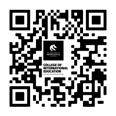
International students can apply to study through a University of Newcastle College of International Education agent or directly via our application form. Follow these easy steps to secure your place with us. Find
STEP 5
Accept your offer
Please sign and return the written acceptance of your offer to the CIE Admissions Office, together with evidence of payment for the amount stated within the Letter of Offer.
STEP 6
Receive your CoE
You will receive an electronic Confirmation of Enrolment. This may take a couple of working days. If you have not received the confirmation from us within that period, please contact us via admissions-CIE@newcastle.edu.au.
STEP 7
Visa and Accommodation
International students will need to then apply for a student visa to study in Australia, and we recommend you apply as soon as possible after receiving you CoE.
STEP 8
Attend Orientation
Four weeks before the start of your program, you will receive more information about the orientation session. To find out more about the orientation, visit internationalcollege.newcastle. edu.au/orientation.html

